|
|
|
Sort Order |
|
|
|
Items / Page
|
|
|
|
|
|
|
| Srl | Item |
| 1 |
ID:
172531


|
|
|
|
|
| Summary/Abstract |
We pose the commensurability problem: When do the estimates generated by actual research designs correspond to quantities of theoretical interest? We study this question in settings where both treatment and outcome are behavior and the treatment effect of interest is decomposable into direct and informational channels. We establish two results. First, the quantity estimated by an actual research design is only commensurate with the total effect in the ideal experiment if treatment status in the research design is a sufficient statistic for the decision-makers’ information. Second, a research design corresponding to a nonideal experiment isolates just the direct effect in the ideal experiment if two conditions hold: (i) there is no information effect in the nonideal experiment and (ii) the decision-maker’s response function is additively separable in treatment and information. We apply our results to three substantive literatures: the efficacy of protest, the empowerment of female candidates, and indiscriminate violence in counterinsurgency.
|
|
|
|
|
|
|
|
|
|
|
|
|
|
|
|
| 2 |
ID:
172532


|
|
|
|
|
| Summary/Abstract |
Is support for democracy in the United States robust enough to deter undemocratic behavior by elected politicians? We develop a model of the public as a democratic check and evaluate it using two empirical strategies: an original, nationally representative candidate-choice experiment in which some politicians take positions that violate key democratic principles, and a natural experiment that occurred during Montana’s 2017 special election for the U.S. House. Our research design allows us to infer Americans’ willingness to trade-off democratic principles for other valid but potentially conflicting considerations such as political ideology, partisan loyalty, and policy preferences. We find the U.S. public’s viability as a democratic check to be strikingly limited: only a small fraction of Americans prioritize democratic principles in their electoral choices, and their tendency to do so is decreasing in several measures of polarization, including the strength of partisanship, policy extremism, and candidate platform divergence. Our findings echo classic arguments about the importance of political moderation and cross-cutting cleavages for democratic stability and highlight the dangers that polarization represents for democracy.
|
|
|
|
|
|
|
|
|
|
|
|
|
|
|
|
| 3 |
ID:
172534
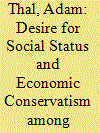

|
|
|
|
|
| Summary/Abstract |
Affluent Americans have disproportionate influence over policymaking and often use their power to advance conservative economic policies that increase inequality. I show that this behavior is partially driven by affluent Americans’ desire for social status. First, I use a new survey scale to show that affluent Americans’ desire for social status strongly predicts their level of economic conservatism. Second, I test my theory experimentally in the context of social media. On sites like Facebook, Instagram, and Twitter, affluent Americans compete for social status by sharing curated versions of their lives that highlight their upper-class lifestyle. When I randomly assign affluent Americans to experience this status competition, it causes them to become more economically conservative. The results help us understand the social and psychological origins of economic conservatism among affluent Americans, and provide the first evidence that social media encourages political behaviors that are conducive to inequality.
|
|
|
|
|
|
|
|
|
|
|
|
|
|
|
|
| 4 |
ID:
172540
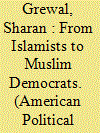

|
|
|
|
|
| Summary/Abstract |
What drives some Islamists to become “Muslim Democrats,” downplaying religion and accepting secular democracy? This article hypothesizes that one channel of ideological change is migration to secular democracies. Drawing on an ideal point analysis of parliamentary votes from the Tunisian Islamist movement Ennahda, I find that MPs who had lived in secular democracies held more liberal voting records than their counterparts who had lived only in Tunisia. In particular, they were more likely to defend freedom of conscience and to vote against enshrining Islamic law in the constitution. Interviews with several of these MPs demonstrate that they recognize a causal effect of their experiences abroad on their ideologies, and provide support for three distinct mechanisms by which this effect may have occurred: socialization, intergroup contact, and political learning.
|
|
|
|
|
|
|
|
|
|
|
|
|
|
|
|
| 5 |
ID:
172535


|
|
|
|
|
| Summary/Abstract |
Public goods in the United States are largely funded and delivered at the local level. Local public goods are valuable, but their production requires overcoming several collective action problems including coordinating supply and minimizing congestion, free-riding, and peer effects. Land use regulations, promulgated by local governments, allow communities to solve the collective action problems inherent in the provision of local public goods and maintenance of property values. A consequence of these efforts is residential segregation between cities along racial lines. I provide evidence that more stringent land use regulations are supported by whiter communities and that they preserve racial homogeneity. First, I show that cities that were whiter than their metropolitan area in 1970 are more likely to have restrictive land use patterns in 2006. Then, relying on Federal Fair Housing Act lawsuits to generate changes in land use policy, I show that restrictive land use helps to explain metropolitan area segregation patterns over time. Finally, I draw on precinct level initiative elections from several California cities to show that whiter neighborhoods are more supportive of restricting development. These results strongly suggest that even facially race-neutral land use policies have contributed to racial segregation.
|
|
|
|
|
|
|
|
|
|
|
|
|
|
|
|
| 6 |
ID:
172542
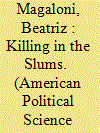

|
|
|
|
|
| Summary/Abstract |
State interventions against organized criminal groups (OCGs) sometimes work to improve security, but often exacerbate violence. To understand why, this article offers a theory about criminal governance in five types of criminal regimes—Insurgent, Bandit, Symbiotic, Predatory, and Split. These differ according to whether criminal groups confront or collude with state actors, abuse or cooperate with the community, and hold a monopoly or contest territory with rival OCGs. Police interventions in these criminal regimes pose different challenges and are associated with markedly different local security outcomes. We provide evidence of this theory by using a multimethod research design combining quasi-experimental statistical analyses, automated text analysis, extensive qualitative research, and a large-N survey in the context of Rio de Janeiro’s “Pacifying Police Units” (UPPs), which sought to reclaim control of the favelas from criminal organizations.
|
|
|
|
|
|
|
|
|
|
|
|
|
|
|
|
| 7 |
ID:
172543


|
|
|
|
|
| Summary/Abstract |
We explore the long-term political consequences of the Third Reich and show that current political intolerance, xenophobia, and voting for radical right-wing parties are associated with proximity to former Nazi concentration camps in Germany. This relationship is not explained by contemporary attitudes, the location of the camps, geographic sorting, the economic impact of the camps, or their current use. We argue that cognitive dissonance led those more directly exposed to Nazi institutions to conform with the belief system of the regime. These attitudes were then transmitted across generations. The evidence provided here contributes both to our understanding of the legacies of historical institutions and the sources of political intolerance.
|
|
|
|
|
|
|
|
|
|
|
|
|
|
|
|
| 8 |
ID:
172536


|
|
|
|
|
| Summary/Abstract |
Beliefs about the incidence of voter fraud inform how people view the trade-off between electoral integrity and voter accessibility. To better inform such beliefs about the rate of double voting, we develop and apply a method to estimate how many people voted twice in the 2012 presidential election. We estimate that about one in 4,000 voters cast two ballots, although an audit suggests that the true rate may be lower due to small errors in electronic vote records. We corroborate our estimates and extend our analysis using data from a subset of states that share social security numbers, making it easier to quantify who may have voted twice. For this subset of states, we find that one suggested strategy to reduce double voting—removing the registration with an earlier registration date when two share the same name and birthdate—could impede approximately 300 legitimate votes for each double vote prevented.
|
|
|
|
|
|
|
|
|
|
|
|
|
|
|
|
| 9 |
ID:
172539


|
|
|
|
|
| Summary/Abstract |
The idea that rulers must seek consent before making policy is key to democracy. We suggest that this practice evolved independently in a large fraction of human societies where executives ruled jointly with councils. We argue that council governance was more likely to emerge when information asymmetries made it harder for rulers to extract revenue, and we illustrate this with a theoretical model. Giving the population a role in governance became one means of overcoming the information problem. We test this hypothesis by examining the correlation between localized variation in agricultural suitability and the presence of council governance in the Standard Cross Cultural Sample. As a further step, we suggest that executives facing substantial information asymmetries could also have an alternative route for resource extraction—develop a bureaucracy to measure variation in productivity. Further empirical results suggest that rule by bureaucracy could substitute for shared rule with a council.
|
|
|
|
|
|
|
|
|
|
|
|
|
|
|
|
| 10 |
ID:
172528


|
|
|
|
|
| Summary/Abstract |
How do citizens within countries hosting U.S. military personnel view that presence? Using new cross-national survey data from 14 countries, we examine how different forms of exposure to a U.S. military presence in a country affect attitudes toward the U.S. military, government, and people. We find that contact with U.S. military personnel or the receipt of economic benefits from the U.S. presence correlates with stronger support for the U.S. presence, people, and government. This study has profound implications for the role that U.S. installations play in affecting the social fabric of host nations and policy implications for the conduct of U.S. military activities outside the United States.
|
|
|
|
|
|
|
|
|
|
|
|
|
|
|
|
| 11 |
ID:
172533


|
|
|
|
|
| Summary/Abstract |
Exclusionary attitudes—prejudice toward outgroups and opposition to policies that promote their well-being—are presenting challenges to democratic societies worldwide. Drawing on insights from psychology, we argue that non-judgmentally exchanging narratives in interpersonal conversations can facilitate durable reductions in exclusionary attitudes. We support this argument with evidence from three pre-registered field experiments targeting exclusionary attitudes toward unauthorized immigrants and transgender people. In these experiments, 230 canvassers conversed with 6,869 voters across 7 US locations. In Experiment 1, face-to-face conversations deploying arguments alone had no effects on voters’ exclusionary immigration policy or prejudicial attitudes, but otherwise identical conversations also including the non-judgmental exchange of narratives durably reduced exclusionary attitudes for at least four months (d = 0.08). Experiments 2 and 3, targeting transphobia, replicate these findings and support the scalability of this strategy (ds = 0.08, 0.04). Non-judgmentally exchanging narratives can help overcome the resistance to persuasion often encountered in discussions of these contentious topics.
|
|
|
|
|
|
|
|
|
|
|
|
|
|
|
|
| 12 |
ID:
172541
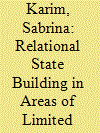

|
|
|
|
|
| Summary/Abstract |
Under what conditions does state expansion into limited statehood areas improve perceptions of state authority? Although previous work emphasizes identity or institutional sources of state legitimacy, I argue that relationships between state agents and citizens drive positive attitude formation, because these relationships provide information and facilitate social bonds. Moreover, when state agents and citizens share demographic characteristics, perceptional effects may improve. Finally, citizens finding procedural interactions between state agents and citizens unfair may adopt negative views about the state. I test these three propositions by randomizing household visits by male or female police officers in rural Liberia. These visits facilitated relationship building, leading to improved perceptions of police; shared demographic characteristics between police and citizens did not strengthen this effect. Perceptions of unfairness in the randomization led to negative opinions about police. The results imply that relationship building between state agents and citizens is an important part of state building.
|
|
|
|
|
|
|
|
|
|
|
|
|
|
|
|
| 13 |
ID:
172527
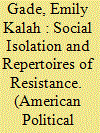

|
|
|
|
|
| Summary/Abstract |
Checkpoints in the West Bank’s Hebron Governorate represent Israel’s ever-present power over Palestinian civilians. Drawing on 71 interviews conducted during the Intifada of Individuals (2015), this article inductively builds theory about the relationship between social isolation and different modalities of resistance. Rather than forcing civilians to comply with the state, checkpoint apparatus instead change the nature and texture of resistance. I suggest that checkpoints structure social connections for civilians on the ground. Checkpoint apparatus which inhibit social connection engender a feeling of hopelessness and foster support for individual, often violent, resistance. Where checkpoints isolate a community as a whole but did not disrupt within-community social connections, citizens maintain hope for the possibility of change, which facilitates a preference for collective resistance. This article identifies troubling consequences checkpoints have on civilians and highlights how oppressive state power can limit some modalities of resistance only to engender support for others.
|
|
|
|
|
|
|
|
|
|
|
|
|
|
|
|
| 14 |
ID:
172538


|
|
|
|
|
| Summary/Abstract |
We study the relationship between social structure and political incentives for public goods provision. We argue that when politicians—rather than communities—are responsible for the provision of public goods, social fractionalization may decrease the risk of elite capture and lead to increased public goods provision and electoral competition. We test this using large-scale data on family networks from over 20 million individuals in 15,000 villages of the Philippines. We take advantage of naming conventions to assess intermarriage links between families and use community detection algorithms to identify the relevant clans in those villages. We show that there is more public goods provision and political competition in villages with more fragmented social networks, a result that is robust to controlling for a large number of village characteristics and to alternative estimation techniques.
|
|
|
|
|
|
|
|
|
|
|
|
|
|
|
|
| 15 |
ID:
172530


|
|
|
|
|
| Summary/Abstract |
Multidimensional concepts are non-compensatory when higher values on one component cannot offset lower values on another. Thinking of the components of a multidimensional phenomenon as non-compensatory rather than substitutable can have wide-ranging implications, both conceptually and empirically. To demonstrate this point, we focus on populist attitudes that feature prominently in contemporary debates about liberal democracy. Given similar established public opinion constructs, the conceptual value of populist attitudes hinges on its unique specification as an attitudinal syndrome, which is characterized by the concurrent presence of its non-compensatory concept subdimensions. Yet this concept attribute is rarely considered in existing empirical research. We propose operationalization strategies that seek to take the distinct properties of non-compensatory multidimensional concepts seriously. Evidence on five populism scales in 12 countries reveals the presence and consequences of measurement-concept inconsistencies. Importantly, in some cases, using conceptually sound operationalization strategies upsets previous findings on the substantive role of populist attitudes.
|
|
|
|
|
|
|
|
|
|
|
|
|
|
|
|
| 16 |
ID:
172537


|
|
|
|
|
| Summary/Abstract |
Strategic voting is an important explanation for aggregate political phenomena, but we know little about how strategic voting varies across types of voters. Are richer voters more strategic than poorer voters? Does strategic behavior vary with age, education, gender, or political leaning? The answers may be important for assessing how well an electoral system represents different preferences in society. We introduce a new approach to measuring and comparing strategic voting across voters that can be broadly applied, given appropriate survey data. In recent British elections, we find that older voters vote more strategically than younger voters and that richer voters vote more strategically than poorer voters, even as strategic behavior varies little across the education level. The differences in strategic voting by age and income are smaller than observed differences in turnout by age and income, but they tend to exacerbate these better-known inequalities in political participation.
|
|
|
|
|
|
|
|
|
|
|
|
|
|
|
|
| 17 |
ID:
172529


|
|
|
|
|
| Summary/Abstract |
Arming is puzzling for the same reason war is: it produces outcomes that could instead be realized through negotiation, without the costly diversion of resources arming entails. Despite this, arms control is exceedingly rare historically, so that arming is ubiquitous and its costs to humanity are large. We develop and test a theory that explains why arming is so common and its control so rare. The main impediment to arms control is the need for monitoring that renders a state’s arming transparent enough to assure its compliance but not so much as to threaten its security. We present evidence that this trade-off has undermined arms control in three diverse contexts: Iraq’s weapons programs after the Gulf War, great power competition in arms in the interwar period, and superpower military rivalry during the Cold War. These arms races account for almost 40% of all global arming in the past two centuries.
|
|
|
|
|
|
|
|
|
|
|
|
|
|
|
|
|
|
|
|
|